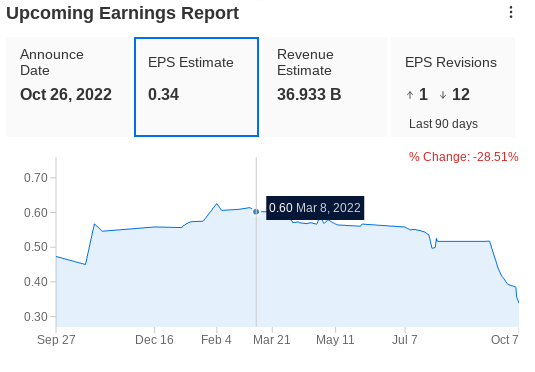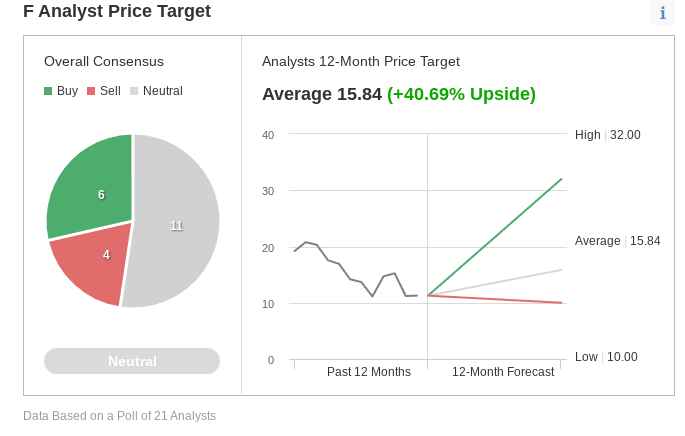Ford’s 45% Plunge This Year Is A Testament To Slowing U.S. Consumer Demand
2022.10.10 14:20
[ad_1]
- Ford’s stock has lost more than a quarter of its value in the past 30 days
- The carmaker is struggling more than its peers to contain costs amid higher inflation
- Persistently high raw material prices also hurt the company’s E.V. transformation
It seems nothing is working for automakers in the current macroeconomic environment. Despite signs that pressure on the global supply chain is finally easing, the recessionary environment is pushing consumers to halt their big-ticket purchases, including cars.
The hardest hit among the U.S. automakers is Ford Motor Company (NYSE:), which has lost more than a quarter of its value in the past 30 days amid growing inventory concerns. The company is now down more than 45% since the beginning of the year.
Adding to the sell-off, Ford’s stock was down nearly 7% for the day at the time of writing, trading at $11.36 a share.

The Dearborn, Michigan-based company told investors last month that it now anticipates that the number of partially built vehicles–which it described as “largely high-margin trucks and SUVs”—will stand at around 40,000 to 45,000 as of the end of the third quarter.
Though it expressed confidence that it could complete and sell those vehicles by the end of the year, a growing number of brands are warning that they’re finding it quite hard to sell their products as consumers deal with the double blow of higher and surging .
High inventories have played a big role in the recent contraction of the U.S. economy. According to Census Bureau data, U.S. retailers have been sitting on a record $732 billion of inventory as of July—a 21% increase from a year ago.
Amid these threats, many analysts have reduced their earnings estimate for Ford company during the past 90 days, suggesting that the huge post-pandemic demand surge may not materialize when it comes to expensive products such as cars.

Ford Earnings Expectations
Source: InvestingPro
‘Just Break Even’
UBS analysts downgraded both Ford and General Motors (NYSE:) this week. In a note to clients, the investment bank said automakers would lose their pricing power as consumers avoid big purchases like cars.
The trend shift represents a U-turn from the last year when car companies were in limited supply, and people were willing to pay above market value.
UBS cut Ford’s earnings per share estimate by even more than most at 61%, noting the Lincoln maker will get closer to just breaking even on free cash flow and earnings before interest and taxes than its competitors.
Ford also seems to be struggling more than its peers when it comes to securing better deals from its suppliers. The company cut its earnings forecast, warning that higher inflation will cost Ford $1 billion more than expected in the quarter that ended on Sept. 30.
The automaker expects adjusted earnings before interest and taxes in the range of $1.4 billion to $1.7 billion when it reports its Q3 earnings later this month. The preliminary estimate is well below the $3.7 billion adjusted Earnings Before Interest and Taxes (EBIT) Ford reported last quarter and the $3 billion it earned a year ago. Shortages of critical parts will also keep its inventory of half-completed vehicles elevated.
The persistently high raw material prices and a threat of a global recession may make it difficult for Ford to raise cash to fund its transformation into a leading electric-vehicle maker. Chief Executive Officer Jim Farley is investing $50 billion in electrifying Ford’s lineup. He has accelerated the automaker’s switch to battery-powered vehicles and pledged to build 2 million E.V.s a year by the end of 2026.
Lingering economic uncertainties, cost pressures, and deteriorating demand outlook are the main reasons that most Wall Street analysts aren’t yet ready to bet on Ford stock and give it a valuation that a growing E.V. carmaker deserves.
In an Investing.com survey of 21 analysts, 70% don’t recommend buying the stock even after this year’s massive pullback.

Source: Investing.com
Bottom Line
Ford stock is a long-term bet that could pay off if the company succeeds in the E.V. market and becomes one of the industry’s major players. But that journey is full of risks and uncertainties, especially while the consumer economy loses momentum. Investors are better off staying on the sidelines.
Disclosure: At the time of writing, the author doesn’t own shares mentioned in this report. The views expressed in this article are solely the author’s opinion and should not be taken as investment advice.
[ad_2]
Source link








